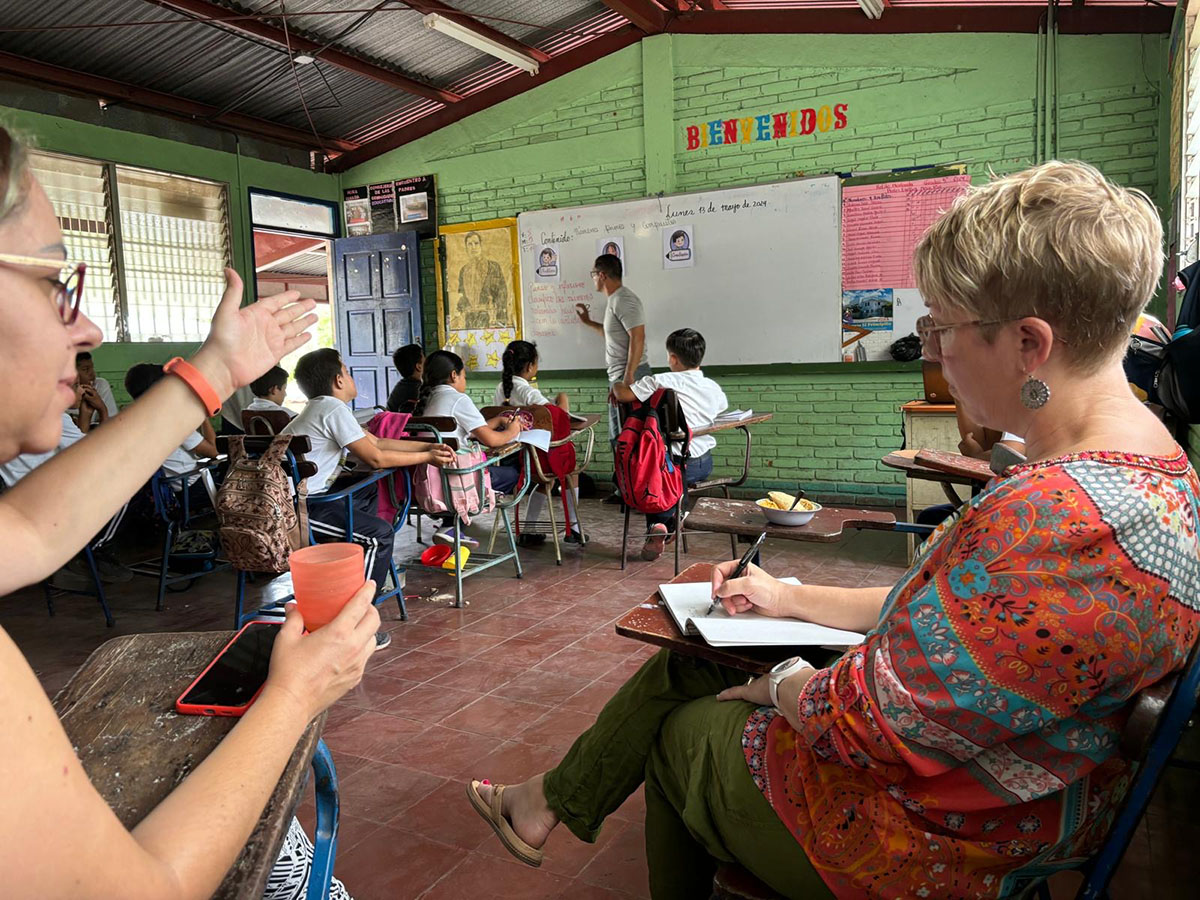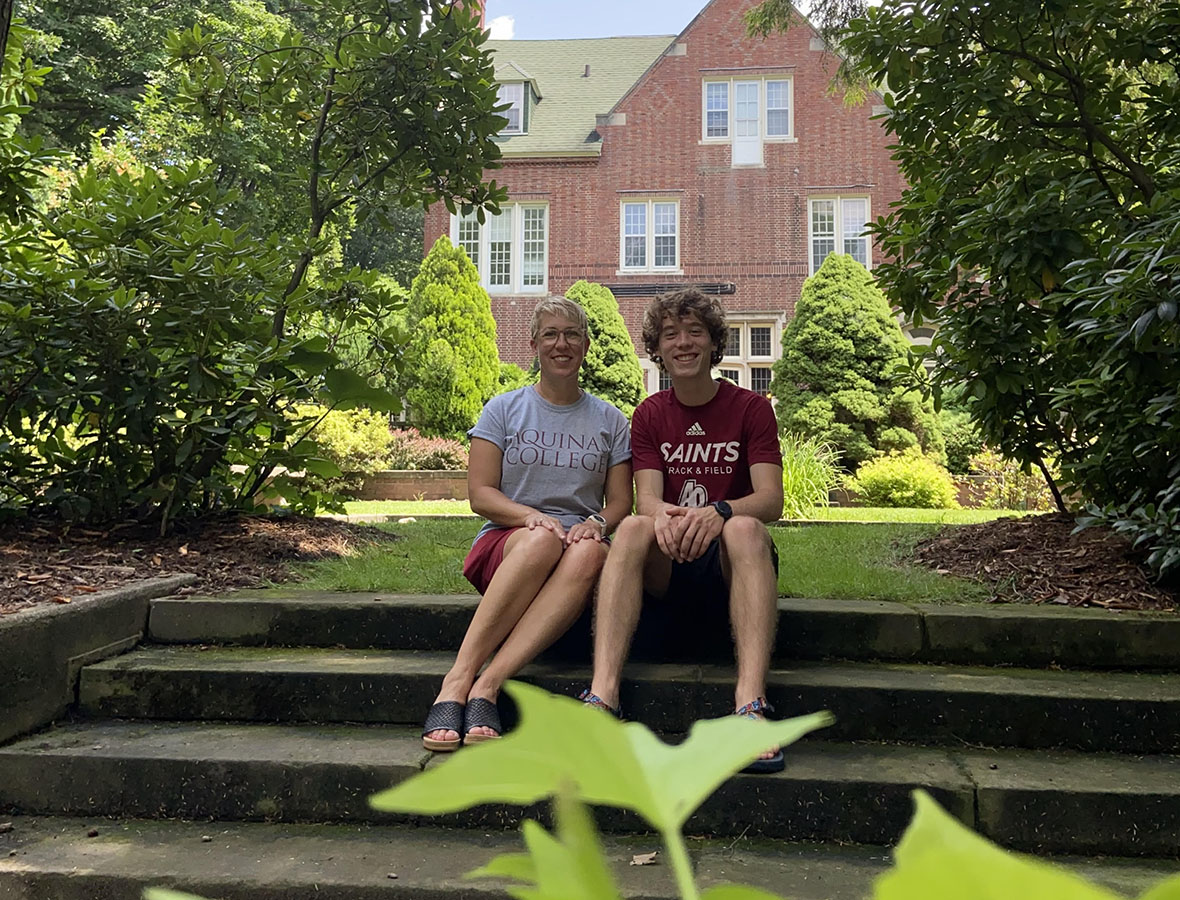Tara Lafferty ‘22, one of Aquinas’ first graduates from the Accelerated Master’s in Education Program (AME), recently shared her story as a science educator and lifelong advocate for inquiry-based learning.
Tara's journey began with a degree in wildlife biology and evolved into a passion for teaching through her roles in zoos and educational institutions. Her dedication to inquiry-based learning has not only shaped her career but also inspired her son to follow in her footsteps at Aquinas.
From Zoos to Classrooms
After graduating with her degree in wildlife biology from Kansas State University, Tara began her journey working in accredited zoos. She found a job in Kansas, where she gained keeper experience and animal training. There, she realized that she loved developing training and educational materials and decided to pursue that further by moving to Grand Rapids, where she began her work at John Ball Zoo in the education department.
Both of her parents had been teachers, and she expressed how that made her hesitant to pursue teaching in her early career. However, working in the zoo world changed that. She said, “It was everything that I loved that I could teach about.” As an educational specialist, she learned how to develop educational programs, how to train volunteers and even how to train some of the animals.
To move up in her career again, she and her husband then moved to Syracuse, New York, where she became director of conservation and education in New York. There, she was in charge of all the conservation and education messaging, which included writing all the signs in the zoo, creating curriculum content for all age levels and working with all the school districts in the area.
Inquiry-Based Learning and Teaching Science
At that time, the new NGSS Standards (Next Generation Science Standards) had recently come out. Tara explains, “It was everything all of us in the zoo world were complaining about, of science not really being taught correctly. A lot of teachers were struggling with it. We had done research and studies of elementary teachers especially not understanding how to teach science, and that was hard. So, we wrote curriculum to be put on the website that would be free for teachers to use.”
Tara explains that she struggled with some courses at Kansas State because it was pure memorization of scientific names that pushed the content and not the application of the scientific terms that could be used. This style of teaching increased her testing anxiety. In hindsight, Tara states, “I knew back then that I wasn’t being taught science correctly. I knew it needed to be more question-based.”
For years, Tara had been working with an inquiry-based learning approach, a style of teaching that focuses on getting students to learn by asking questions and embracing their natural curiosity about the world, rather than memorizing facts. According to Tara, “It’s not about my discovery, it’s about my students’ discoveries.”
Tara's Quest for the Perfect Teaching Degree
After her first son was born, Tara decided that she would be a stay-at-home mom for a while. They moved to Indiana, and she found some part-time work at a health museum. When she returned, she realized she needed to re-evaluate what gave her the most joy out of her job. That’s when she decided she needed to go back for her teaching certification.
At first, Tara had a hard time finding a suitable teaching degree. There was a teacher shortage, and everyone was talking about it; however, no one was doing much about it. Despite having a lifetime of experience, the colleges she applied to wanted her to start from scratch, if they contacted her back at all. One even wanted her to retake the SAT.
Eventually, her church told her that she should reach out to Aquinas. Once she did, it didn’t take long for her to be accepted into the program and the AQ community.
The AQ Experience
Tara began her AQ journey by taking Intro to Education with Professor Stacy Slomski.
Tara then took a summer education course and talked at length with Dean Susan English. Due to the needs for Tara's family, she needed to work full-time and didn't know how she could go to work and attend school at the same time. After that first year, the AME program was created and Tara could work towards her master's in education.
Dr. English had Tara interview with two schools at the Grand Rapids Diocese. Both of those schools knew that she didn’t have her teaching certificate yet, and Tara remembers that both schools told her, “You’re working with Aquinas at the same time, and we trust them.” Since she was a part of the diocese, this agreement also afforded her a scholarship equal to 50% off of her tuition, using the Donnelly Scholarship.
She started working full-time as a teacher with Divine Providence Academy (DPA), a micro-school that practiced inquiry-based learning and allowed students to work at their own pace. “I was teaching fourth through eighth grade, at the same time, in the same room,” explains Tara. “I taught English, math and science. But I also taught science for all grade levels, so someone else would teach my students social studies. I learned how to differentiate at DPA. If a student took a pretest in math and passed that test, they moved on to the next unit. And if a student needed to hang out longer in a unit, then they could.”
“They were simply amazing. It was nice to be able to teach, to have a bunch of questions and – instead of loading those on my principal – I could take it to Aquinas. We would sit and talk as a group with all of us growing and learning about our challenges and questions. We were all the weird ones at the school, so we could all ask each other,” says Tara.
“It was also pretty awesome to see people who didn’t have jobs get placed. There was one moment when Jill Annabel was asking a student questions, and he stopped and said wait, this feels like an interview. And I looked at him and went, it is. Sure enough, he ended up with a job two weeks later. It’s amazing how Aquinas can intertwine and how Aquinas is well known in the education community. I don’t run into any teacher at any school that doesn’t have a best friend or they themselves haven’t gone to Aquinas for education. Aquinas and the Grand Rapids diocese – that partnership was essential.”
Tara currently teaches 7th and 8th grade at Kent City Community Schools. She says that she loves her school because they embrace inquiry-based learning with their curriculum from OpenScied and they grant her the freedom to amend the lessons as needed for her students.
“I know that Aquinas was watching me and that they started the AME for people like me - those with teachable degrees, experience in the working community and knowledge to bring into the classroom. I’m so thankful that I went forward with the master's degree because now my pay grade is higher and I feel so much more confident in what I know and what I’m doing. And it’s even taken me internationally to Nicaragua,” she explains.
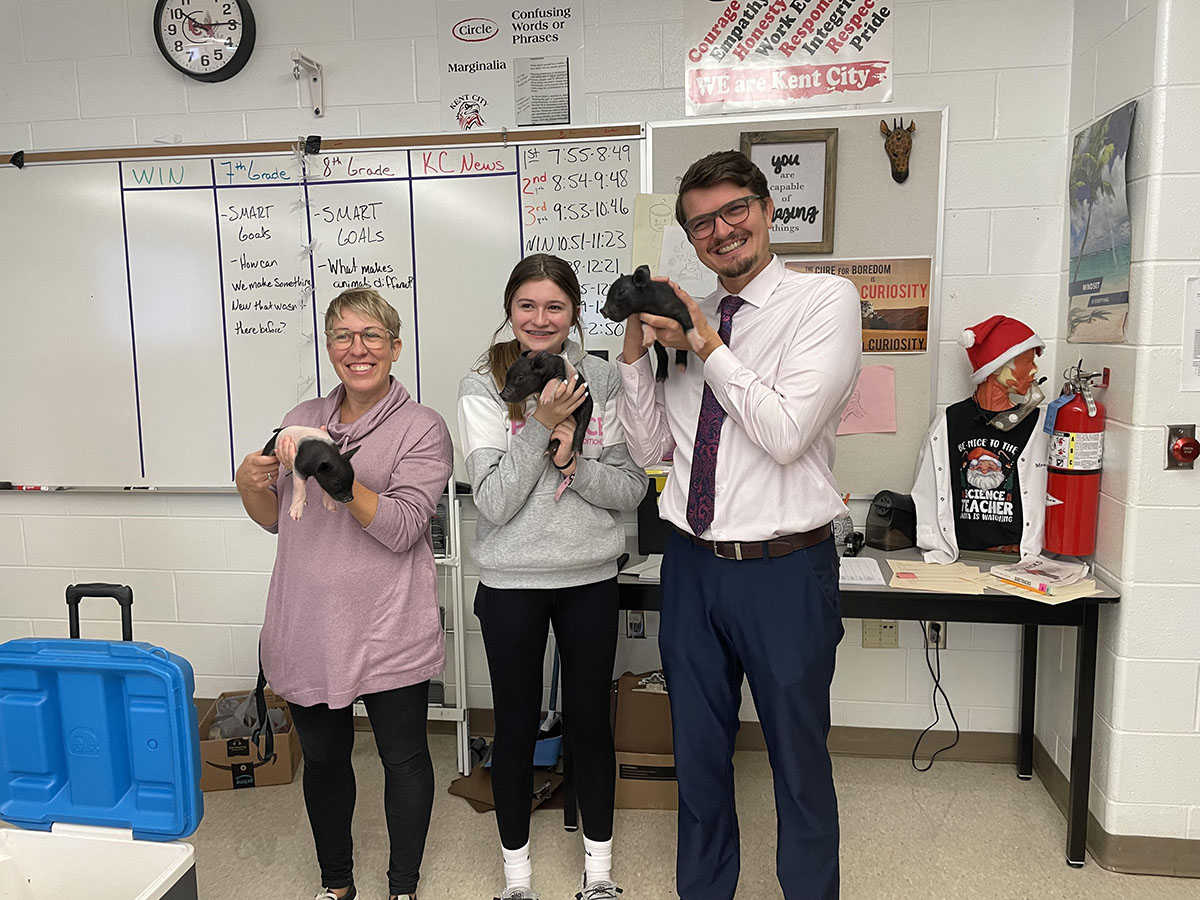
Bringing Inquiry-Based Learning to Nicaragua
In May of 2023, Tara went to Nicaragua to work with the Ministry of Education and lead teachers' workshops.
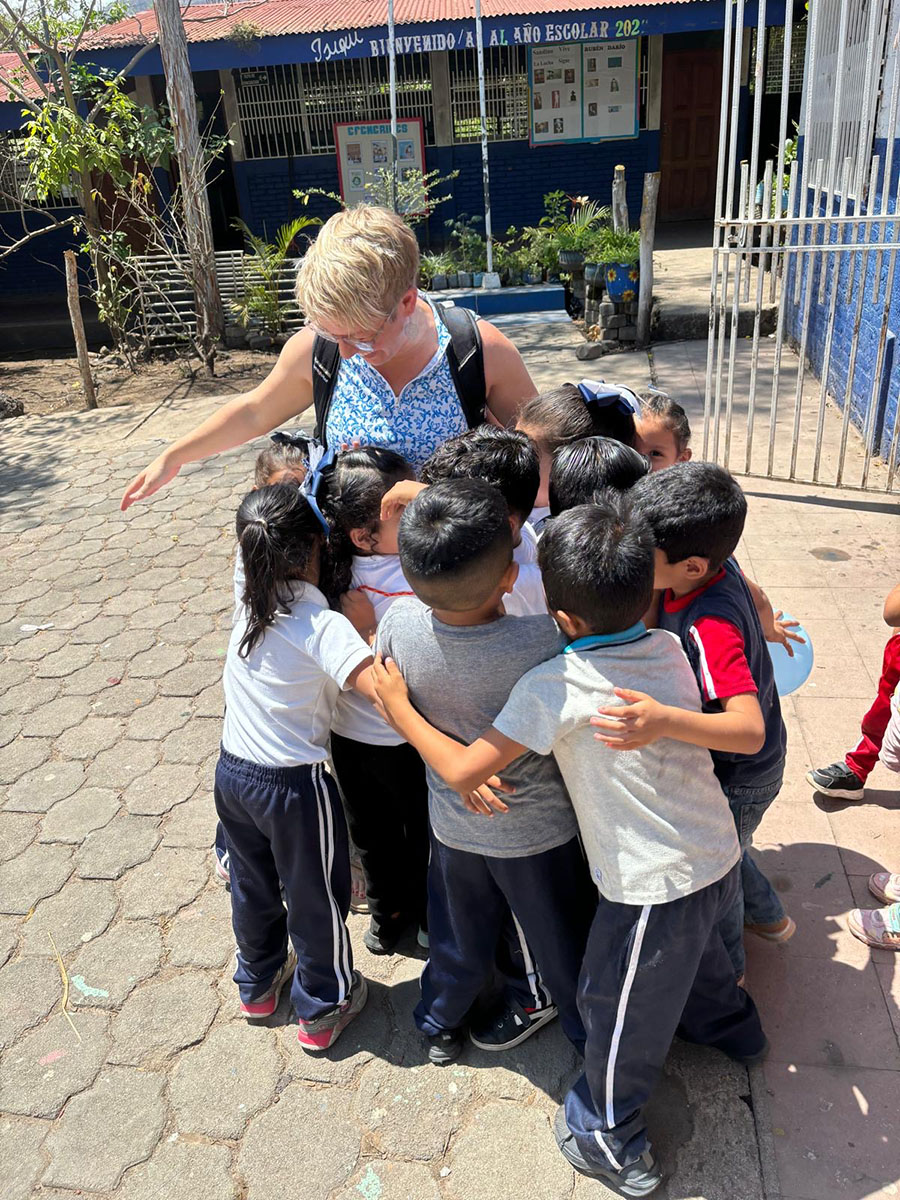
She found this opportunity through her husband, Ryan, who works at GVSU as an adjunct professor. He works with Dr. Paul Lane who started the Nicaragua program. While the program started as a grant from GVSU, the funding was dropped after the first year; however, he believed in the mission and continued to participate every year without that funding.
The approach he uses is called innovation-based design thinking, which Tara explains is the same as inquiry-based learning. Dr. Lane knew about the work Tara had done in zoo education and wanted her to go with him. At first, she felt she needed more education before she was ready to go. Then, years later and with her master’s degree in hand, she ventured to Nicaragua.
There, Tara witnessed many cultural differences that shocked her. She mentioned that – since the government owns the universities, the Ministry of Education in Nicaragua is a government department. This is also the first time in 20 years that there has been an active decision to change the way teachers teach.
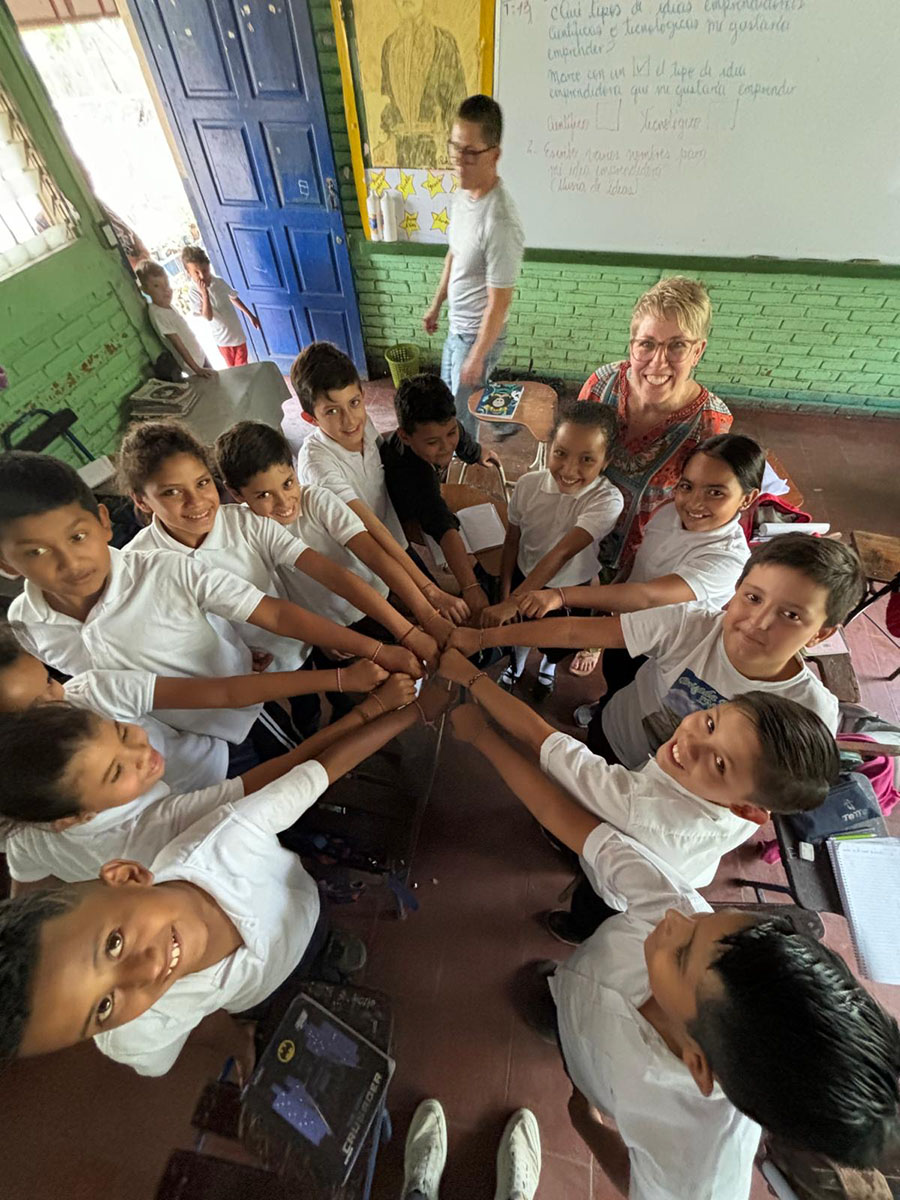
She also explains that the learning is notably different from the way it’s done in the U.S. According to Tara, “It’s call-response. They have 45 students in a room. They stay in their seats. They do not get up. They do not ask questions if the questions are about content. You simply write down the notes, and that’s it. The next day, you repeat the notes back and then move on to the next thing.”
Being the second poorest country in the world, Tara explains that “poverty is really high. The school that I was in was very rural. They’re doing a great job with what they have, but at the same time, we need to improve a little bit. We are exactly the same in that we are all learning and growing, and that is the one thing we can all do as teachers”
Despite the challenges, Tara’s experience in Nicaragua was life-changing, and she is excited to return in August of 2024. “I feel like my two worlds and everything I have always dreamed of finally came together,” Tara states.
Carson's Journey at AQ and Tara's Reflections
Back in the States and carrying out the family tradition of teaching, Tara’s son, Carson, is also studying at AQ to be a teacher. He’s currently enrolled as a junior in our education program and hopes to teach social studies.
When he first expressed interest in teaching, she advised him to look at the cost of the school and what the school was willing to provide. According to Tara, Carson later came to her saying, “Okay Mom, I’m not saying this because it’s your school, but I think Aquinas is it. They’re so integrated around here.”
Tara explains that he’s from the Rockford school district, “from a school with 600 students in their graduating class. It floored him how Aquinas was treating him and talking to him personally. He was able to run, and that was important for him. They very much made it family.”
She relayed one notable experience that her son had shared with her. Carson is part of the history club, and there was one day when “he was walking down the hallway, and the person in charge of the history club just left his room while he was teaching just to talk to him. And I’m like, yeah honey, that’s Aquinas. And he said that if he had gone to any other school, that wouldn’t have happened.”
Tara looks back fondly on the experiences she had at Aquinas. She built an amazing community at AQ within the first AME program, and they still maintain a group chat to connect. She also stated that the personal attention from the professor is essential and that she still carries a lot of what they taught her.
“I was nervous that I may not be a strong teacher, but I realized that I am. Walking into any meeting, knowing that I had the education that I had, it’s not scary. I’m not timid at all. It definitely gave me the strength and confidence that I needed to be able to walk into any classroom or meeting .”
